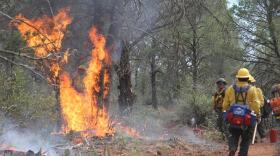Emergency fire shelters used by wildland firefighters may soon become more effective by using NASA technology. Arizona Public Radio’s Aaron Granillo reports they’ll be made with similar heat-resistant materials used to enter the Martian atmosphere.
NASA teamed up with US Forest Service to design a new shelter in 2013, after the Yarnell Hill Fire. 19 Granite Mountain Hotshots died, when the units they deployed were unable to save them. Anthony Calomino is on the NASA team. He says they’ve retrofitted current fire shelters with space technology that can withstand extreme temperatures.
"The heat shields that we design for Mars would be able to handle as much as 2,700 degrees," says Calomino. "Typically, wildfires are anywhere from 1,200 degrees up to something like 1,800 degrees."
Calomino says their materials are used on the shelter’s interior, to better insulate the blanket, and allow firefighters more time to breathe. Recent tests shows the NASA shelters can survive twice as long as the current design. The agency hopes to have a prototype ready for use by next fire season.









